Press
MEDIA ADVISORYS
PERMANENT PEOPLES’ TRIBUNAL |
Founder: Lelio Basso |
President: Salvatore Senese |
Hearing on
Neo-liberal Policies and European Transnational Corporations in Latin America and the Caribbean
Vienna
May 10-12, 2006
INDICTMENT
|
Members of the Panel:
Elmar Altvater (President, Germany), Miren Etxezarreta (Spain), Susan George (France), Lilian Manzella (United States), Francesco Martone (Italy), Freda Meissner-Blau (Austria), Sandra Quintela (Brazil), Roberto Schiattarella (Italy), Gianni Tognoni (Secretary-General, Italy) |
ENLAZANDO ALTERNATIVAS 2
www.alternativas.at |
FONDAZIONE LELIO BASSO – SEZIONE INTERNAZIONALE
www.internazionaleleliobasso.it |
1. Why a Permanent Peoples’ Tribunal on European Transnationals?
The Enlazando Alternativas 2 (EA2) officially requested to convene a session of the Permanent Peoples’ Tribunal (PPT) on Transnational Corporations (TNCs) in Latin America on 2 February 2006. According to the Statutes of the PPT they requested an investigation of the increasingly dominant role of European TNCs in strategic areas, such as services, infrastructure, petroleum, water, finance and telecommunications. They particularly asked for an examination of the threats thereby posed to political sovereignty, development policy, economic autonomy and democratisation in Latin America. The network of organisations represented in EA2 requested a hearing of many cases from Latin American countries on aspects of life and work, rather than a formal judgment. The PPT accepted the request, which appeared specifically relevant for the institutional role of the PPT for two main reasons:
- The peoples, the movements, the spectrum of actors participating in the EA2 represent one of the most important expressions of the ongoing struggle for the rights of peoples, which is the justification of the existence of the PPT, based on the Universal Declaration of the Right of Peoples in Algiers, 1976.
- The themes of the request are an important opportunity for continuing and expanding the research role of the PPT with respect to the relationship between economic laws and human and peoples’ rights. This work is ongoing since the beginning of the Tribunal in the second half of the 1970s in a series of judgments, which include sessions on:
- the role of transnational corporations in the Latin American dictatorships (Brussels, 1975)
- the causes of impunity of those who committed crimes in Latin American countries (Bogota’ 1991);
- the conquest of Latin America and the origins of International Law (Venice, 1992);
- Transnational Corporations in the Textile, Garment and Sportswear industries and their impact on labour rights and the environment (Brussels, 1998)
- the case of the Bhopal-disaster and corporate irresponsibility (Bhopal, 1991- London, 1994);
- the wrong-doings of TNCs (Warwick, 2001)
- the role of TNCs in Colombia (Berne, 2005; Bogota’, 2006).
2. The Procedure
The hearings of the PPT took place in three sessions following an opening session, each lasting around 4 hours. A detailed dossier of case studies and complaints was submitted to the jury. Witnesses and experts presented orally the documented cases and also answered questions posed by members of the jury. The cases covered several areas of TNC activities and their impact on: natural resources, labour rights, public services with particular emphasis on water provision, sewage and electricity, the role of global finance and the role of TNCs active in financial services in Latin America, the food chain and agricultural diversity, the oil and gas industry. (Full documentation will be available on <http://www.TNI.org>.)
3. General Indictment
The members of the jury of the PPT thank the organisers of this important event, commend the thoroughness and high quality of the research and documentation presented in the course of the hearings and salute the commitment of the witnesses to achieving justice for their communities and their countries.
We have heard testimony and case studies concerning several dozen TNCs and banks headquartered in Austria, Finland, France, Germany, Great Britain, Italy, the Netherlands, Spain and one non-EU country, Norway. We have been presented with overwhelming evidence concerning European TNCs abuses of human, social, cultural and workers’ rights, their irresponsible and sometimes irreversible actions towards the environment and their complete disregard for the welfare of local communities.
We have heard, in particular, of the complicity of European governments that aid and abet their own TNCs. Furthermore, international public institutions including the World Bank, the Inter-American Development Bank, the International Monetary Fund, the World Trade Organisation, the European Investment Bank, Export Credit and national development agencies, as well as European bilateral free trade agreements, pave the way for the exploitative activities of TNCs.
We were presented with cases of corporate-led public service privatisation (notably water, sanitation and energy), use and extraction of natural resources, oil exploration, land use and agribusiness practices, expansion of monocultural plantations for pulp, liberalisation of financial services and the role of European Banks in various Latin American countries.
4. The Findings of the Tribunal
On the basis of the above we have identified common elements and threats that the PPT considers deserving of further work:
- Threats to the right to access essential services: Water has been transformed into a commodity rather than a common resource. Pricing and distribution policies implemented by TNC with the support of International Financial Institutions deprive broad sections of population (mostly the poor) from the enjoyment of this fundamental human right. Electricity privatisation and liberalisation has similar results;
- Threats to the right to land: The expansion of monocultural plantations for export (notably for soya and wood pulp) is destroying small-scale farmers’ livelihoods, while preventing fair and equitable access to land;
- Threat to the right to food sovereignty, safety and security: Industrial scale production of food for export, and the privatisation of biodiversity and seeds, driven by imbalanced international trade regimes and corporate interests, is destroying the capacity of Latin American countries to realize these rights;
- Threats to labour rights: So-called labour “flexibility”, the push for high returns for private investment, the need to produce cheap goods for global markets, together with the repression of Latin American trade unions, undermine core labour standards. Furthermore, TNCs use cheap suppliers of labour in order to keep costs low, thereby expanding an already huge informal sector;
- Threats to indigenous peoples’ rights: EU TNCs and Latin American governments collaborate in invading and exploiting indigenous peoples’ lands without their prior informed consent or participation, thereby violating their cultural identity and fundamental rights;
- Threats to environmental rights: Negligence and abuse by EU TNCs of fragile ecosystems in hotspots of biodiversity and wildlife, as well as key bioregions for climate stabilisation augmented by deforestation for economic reasons, contamination of water, infrastructure expansion, result into a substantial ecological debt and contradict EU public commitments for sustainable development. Irresponsible exploitation of natural resources by European TNCs such as oil and gas result in widespread ecological impacts both at a local and ultimately global level;
- Threats to civil and political rights: EU TNCs can proceed undisturbed thanks to the complicity and cooperation of local and national governments. All this can occur in spite of popular dissent since those same governments do not hesitate to repress dissent and often crackdown on environmental, social and labour movements.
All of these threats combined with the erratic behaviour of financial markets result in a major attack to economic and social rights to development, and hence represent a major challenge for the future work of the PPT.
TNCs are not solely responsible for this situation. The responsibility also extends to the host governments and the EU that allows enterprises to apply inferior standards to those practised in Europe. The EU, in its negotiations with Latin American countries, follows an agenda of trade and financial liberalisation and support for TNCs. Economic aid is often made conditional to the acceptance of EU criteria, while the EU maintains trade and preferential arrangements with certain countries even where they are in violation of international human rights norms, such as those established by the ILO.
The PPT has been unfortunately obliged to consider these cases due to the unavailability of any other forum for adequate recourse and redress as well as the absence of binding rules applicable to TNCs. Unless and until such norms are developed and properly implemented cases as the ones examined will recur again and again.
Therefore the PPT concludes that the complexity and seriousness of accusations and the corresponding threats require further investigation with a view to contribute to the development of international legal instruments that would make TNCs truly and effectively responsible and accountable for their practices.
Perspectives
The PPT purpose and modalities of action have always been intended to provide support and to empower social movements and responsible citizens in their different struggles for justice and human rights. Not incidentally, therefore, the preparation of this session has generated an unprecedented level of interest and expectation in Latin American and European movements, that created new networks and a basis for strengthening their struggles, resistance and search for alternatives to the dominant economic and social paradigm.
At the same time, the opportunities that Latin America is currently experiencing in its own way to social justice and self-determination can provide inspiration to movements in Europe, in their practices and proposals for an alternative of justice. The cross-fertilisation of action and analysis, that this Tribunal seeks to foster, makes its work more than a mere academic exercise, but rather a genuine effort to contribute with its experience to a common endeavour of social, environmental and labour movements in both regions. It is their determination and visionary action that encourage us to pursue our future initiatives dealing with the challenges that economic and financial globalisation pose on the affirmation of fundamental peoples’ rights. In view of the importance of the findings of this session, the Tribunal herewith states its intention to convene a formal session to judge the responsibilities and activities of European TNCs in Latin America.
For additional information on these Tribunals visit the website <http://www.internazionaleleliobasso.it>.
European transnationals put on trial ahead of EU-Latin America summit
Civil society and social movement activists from Latin America and Europe today heralded the launch of a Permanent People’s Tribunal, which will hold over 30 of Europe’s largest transnational corporations to account for human rights violations, economic and ecological injustices in the LAC (Latin America and Caribbean) region. The Tribunal hearings will take place from 10 to 12 May in Vienna, to coincide with the EU-LAC Heads of States and Governments Summit in the city.
Professor Elmar Altvater, chair of the Tribunal, explained: “This Tribunal provides a space for those who don’t normally have a voice, representatives of the communities in Latin America affected by the impunity of European transnationals.”
Joao Pedro Stedile of the Brazilian Landless Workers’ Movement (MST), which will present a case against Aracruz Celulosa, a multinational producer of paper pulp and wood products, said: “Our experience of 15 years of neo-liberalism is that transnational capital has taken control of our natural resources: our trees, water and seeds. The People’s Tribunal is an occasion for the farmers and workers of Latin America to demand a stop to the exploitation of our people and resources.”
Christian Ferreyra of the Centro de Documentacion e Informacion Bolivia (CEDIB), which will bring a case against British energy company BP and Repsol, the Spanish oil and gas corporation, for their role in a controversial oil pipeline project, said: “We oppose this pipeline as a channel for the expropriation of Bolivia’s natural resources. We welcome the nationalisation programme announced by President Evo Morales, but as Bolivian social movements we will keep up the pressure until oil and gas are nationalised under control of a state company, governed in a participatory way.”
Press Conference: Verdict of the People’s Tribunal
9 am, Friday 12 May
Das Kongresshaus, A- 1050 Vienna, Margaretengürtel 138
Further information
Oscar Reyes, Transnational Institute (English) oscar@tni.org +43 (0)699 813 290 53
Robert Gerstbach, DKA (German) <robert.gerstbach@dka.at> + 43 (0)676 88 0 111 0 72
Cecilia Olivet, Hemispheric Social Alliance (Spanish) <cecilia@realworldradio.fm> +43 (0)699 814 832 68
<www.alternativas.at>
MEDIA ADVISORY
Solidarity vs. free trade: battle lines drawn as EU-LAC summit opens
People’s solidarity and the right to control natural resources take centre stage today at Enlazando Alternativas, an alternative summit held to coincide with the EU-LAC (Latin America and Caribbean) Heads of States and Governments meeting in Vienna.
Brid Brennan of the Amsterdam-based Transnational Institute, one of the summit organisers, said: “EU rhetoric about political dialogue and development co-operation cannot hide the fact that European governments are in Vienna to push a free trade agenda. By contrast, Enlazando Alternativas shows that genuine solidarity is possible – linking alternatives from the ground up, from peasant farmers’ struggles in Latin America through to campaigners against the EU constitution.”
The EU and Central American countries – unified under an Economic Integration System known as SICA – are expected to start negotiations of a free trade treaty at the EU-LAC summit. Jorge Coronado of the Foro Mesoamericano, Costa Rica, said: “We are absolutely opposed to the proposed free trade agreement. Our experience of free trade is that it is dismantling our economic structures and opening the door for transnationals to exploit our resources. In the Andes, we’ve been struggling against a free trade agreement with the US and we’ll take the same fight to the proposed treaty with the EU.”
With the nationalisation of gas in Bolivia, and recent moves by the country to join Venezuela and Cuba in ALBA (Alternativa Bolivariana para las Américas), Enlazado Alternativas (or ‘linking alternatives’) is expected to focus on emerging, practical alternatives to the free trade agenda.
Carlos Aguilar of the Hemispheric Social Alliance, one of the summit organisers, said: “The nationalisation process in Bolivia is important for us. Strategic resources such as gas and water should be placed in public hands for the benefit of all.”
Aleida Guevara, daughter of Ernesto 'Che' Guevara and a member of the Cuban delegation at the alternative summit, said: “ALBA is showing that the transfer of resources meets people’s needs far more effectively than free trade agreements.” She also spoke of the “genuine solidarity” exhibited by the ‘oil for doctors’ exchanges between Cuba and Venezuela.
The Enlazando Alternativas alternative summit , which gathers over 1,000 civil society and social movement activists from Europe and Latin America, continues until Saturday 13 May. The closing event will feature an encounter between President Hugo Chavez (Venezuela), President Evo Morales (Bolivia) and Foreign Minister Felipe Perez Roque (Cuba) and social movement representatives from Europe and Latin America: Jose Bove (Confederation Paysanne, France) Joao Pedro Stedile (MST, Brazil), Gonzalo Berron (Hemispheric Social Alliance), Blanca Chancoso, (Conaie, Equador) Gloria Ines Ramirez (Colombian trade unionist), Brid Brennan (Transnational Institute, Netherlands), Alexandra Strickner (IATP). The Presidents are expected to speak at 5pm, although exact timings are subject to change.
Further information
Oscar Reyes, Transnational Institute (English) oscar@tni.org +43 (0)699 813 290 53 / +44 7739 827208
Robert Gerstbach, DKA (German) + 43 (0)676 88 0 111 0 72
Cecilia Olivet, Hemispheric Social Alliance (Spanish) +43 (0)699 814 832 68
MEDIA ADVISORY
European transnationals put on trial ahead of EU-Latin America summit
Civil society and social movement activists from Latin America and Europe today heralded the launch of a Permanent People’s Tribunal, which will hold over 30 of Europe’s largest transnational corporations to account for human rights violations, economic and ecological injustices in the LAC (Latin America and Caribbean) region. The Tribunal hearings will take place from 10 to 12 May in Vienna, to coincide with the EU-LAC Heads of States and Governments Summit in the city.
Professor Elmar Altvater, chair of the Tribunal, explained: “This Tribunal provides a space for those who don’t normally have a voice, representatives of the communities in Latin America affected by the impunity of European transnationals.”
Joao Pedro Stedile of the Brazilian Landless Workers’ Movement (MST), which will present a case against Aracruz Celulosa, a multinational producer of paper pulp and wood products, said: “Our experience of 15 years of neo-liberalism is that transnational capital has taken control of our natural resources: our trees, water and seeds. The People’s Tribunal is an occasion for the farmers and workers of Latin America to demand a stop to the exploitation of our people and resources.”
Christian Ferreyra of the Centro de Documentacion e Informacion Bolivia (CEDIB), which will bring a case against British energy company BP and Repsol, the Spanish oil and gas corporation, for their role in a controversial oil pipeline project, said: “We oppose this pipeline as a channel for the expropriation of Bolivia’s natural resources. We welcome the nationalisation programme announced by President Evo Morales, but as Bolivian social movements we will keep up the pressure until oil and gas are nationalised under control of a state company, governed in a participatory way.”
Press Conference: Verdict of the People’s Tribunal
9 am, Friday 12 May
Das Kongresshaus, A- 1050 Vienna, Margaretengürtel 138
Further information
Oscar Reyes, Transnational Institute (English) oscar@tni.org +43 (0)699 813 290 53
Robert Gerstbach, DKA (German) + 43 (0)676 88 0 111 0 72
Cecilia Olivet, Hemispheric Social Alliance (Spanish) +43 (0)699 814 832 68
Alternative summit challenges EU-LAC Heads of States to ‘stop neo-liberalism by the backdoor ’
Civil society organisations from across the EU, Latin America and the Caribbean (LAC) will convene in Vienna from 10-13 May, sending a message to the Heads of States and Governments Summit to stop promoting a bi-regional free trade agenda.
“Latin Americans have rejected neo-liberalism on the streets and, in several cases, in the ballot boxes too,” says Gonzalo Berron of the Hemispheric Social Alliance, a coalition of social movements and citizens’ networks of the Americas. “Our meeting in Vienna will send a clear message that we do not want neo-liberalism by the back door, in the shape of ‘strategic partnerships’ and interregional free trade agreements.”
The Social Encounter on ‘Linking Alternatives in a new era of Europe-Latin America relations’ is built around five key themes: the effects of neo-liberal globalisation; EU-LAC development co-operation; militarisation and human rights; EU-LAC political dialogue; and alternative regional integration strategies.
It will feature a Tribunal to hold several of Europe’s largest transnational corporations to account for human rights violations, economic and ecological injustices in the LAC region.
The final plenary of the Encounter will be a dialogue between social movements and governments, with a panel including President Hugo Chávez of Venezuela and President Evo Morales of Bolivia.
A full programme will be available shortly from <www.alternativas.at>.
Interviews with speakers available on request.
DATES: Wednesday 10 May to Saturday 13 May.
VENUES: Stadthalle, A-1150 Vienna, Vogelweideplatz 14
Das Kongresshaus, A- 1050 Vienna, Margaretengürtel 138
REGISTER: Entry is free. Journalists should fill in the press accreditation form at:www.alternativas.at/English/ENpresse.php
WEBSITE: Practical information, press centre and programme at: www.alternativas.at
BRUSSELS PRESS CONFERENCE:
10am, Monday 8 May
Passage Room
International Press Center
Résidence Palace
Rue de la Loi 155
1040 Bruxelles
FURTHER INFORMATION:
Oscar Reyes, Transnational Institute (English) <oscar@tni.org> +31 20 662 66 08 (until 8 May) / +43 (0)699 813 290 53 (from 9 May)
Cecilia Olivet, Hemispheric Social Alliance (Spanish) <cecilia@realworldradio.fm> +43 (0)699 814 832 68
Robert Gerstbach, DKA (German) <robert.gerstbach@dka.at> + 43 (0)676 88 0 111 0 72
Registration for journalists
please fill in the accreditation form
Press Material
Download Programme EA2
Logo Enlazando Alternativas
Logo Foro de Radios
Poster in 300 dpi and in internet resolution
Flyer for download
Call to Vienna : Deutsch, Español,
English,
Français,
Italiano
Jingles: 1, 2, 3, 4, 5
Video-Clip of the Press Conference: http://www.ctv-net.org/web/content/view/84/25/
(You need a Quicktimeplayer (7), which you can download for free under http://www.apple.com/quicktime/download)
Photos
Here you can download photos in 300dpi resolution.
Copyright for free, but only if the photographer is named!
|

Brandrodung im Regenwald
Photo: DKA
|
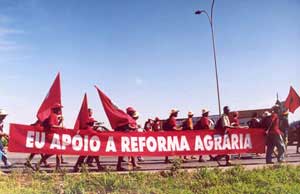
Marsch der Landlosen
Photo: DKA
|
|
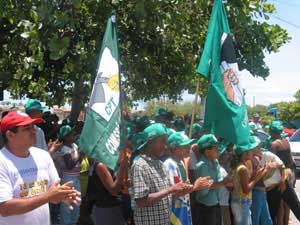
CPT-Kundgebung
Photo: Christian Herret
|
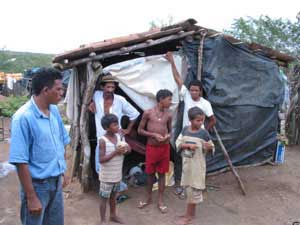
Familie vor ihrer Hütte
Photo: Christian Herret
|
|
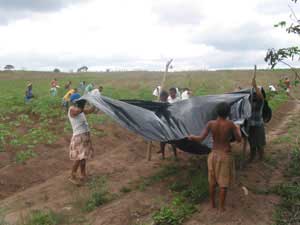
Frauen und Kinder bauen eine Hütte
Photo: Christian Herret)
|
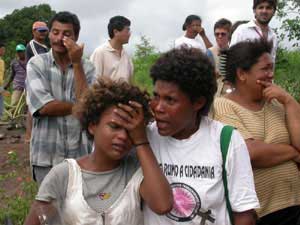
CPT-Kundgebung
Photo: DKA
|
|
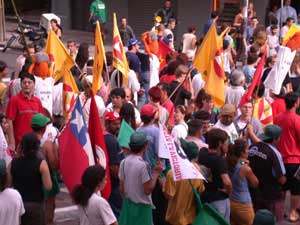
Weltsozialgipfel in Porto Alegre/Brasilien
Photo: Andreas Novy
|
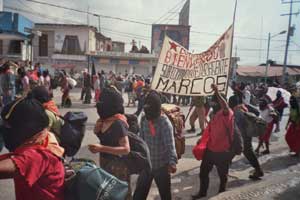
Zapatistas in Palenque/Chiapas/Mexico
Photo: Rubén Rocha Torrez
|
|
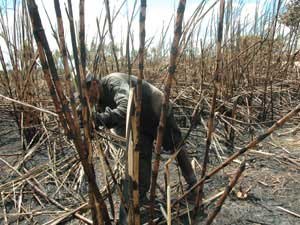
Arbeit auf einer Zuckerrohr-Plantage in Brasilien
Photo: Hans Romstorfer
|
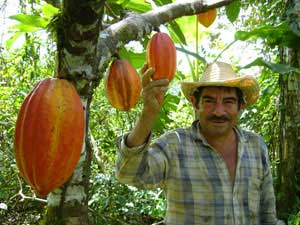
Mann bei einem Kakaobaum (die Bohnen sind in den Früchten)
Photo: DKA
|
|
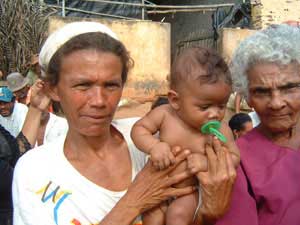
Zwei Frauen mit Baby
Photo: DKA
|
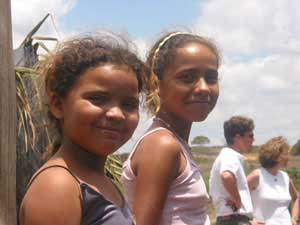
Mädchen
Photo: Christian Herret
|
|
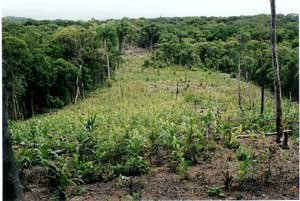
Maisfeld in einem gerodeten Teil des Regenwalds
Photo: DKA
|
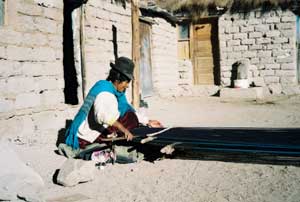
Weberin in Quetena/Süden von Potosí/Bolivien
Photo: Eveline Rocha Torrez
|
|
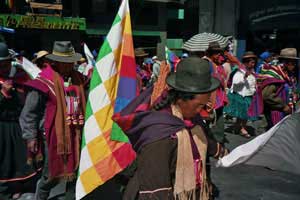
Marcha de la Quinua: Demonstration der Quinua-Bauern
in La Paz/Bolivien
Photo: Eveline Rocha Torrez
|
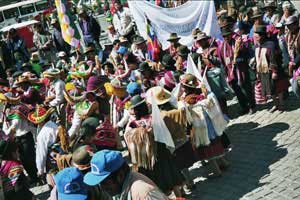
Marcha de la Quinua: Demonstration der Quinua-Bauern in
La Paz/Bolivien
Photo: Eveline Rocha Torrez
|
|
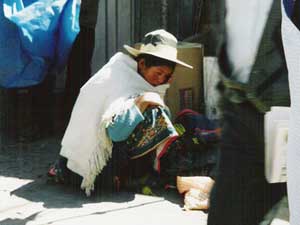
Kleine Zitronenverkäuferin aus Potosí in La Paz/Bolivien
Photo: Eveline Rocha Torrez
|
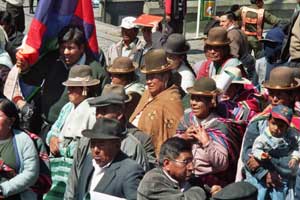
Marcha de la Quinua: Demonstration der Quinua-Bauern
in La Paz/Bolivien
Photo: Eveline Rocha Torrez
|
|

Frauen am Markt von Tarabuco/Sucre/Bolivien
Photo: Eveline Rocha Torrez
|
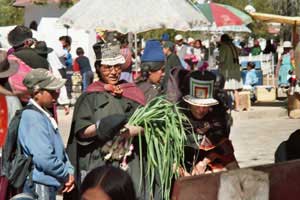
Frauen am Markt von Tarabuco/Sucre/Bolivien
Photo: Eveline Rocha Torrez
|
|
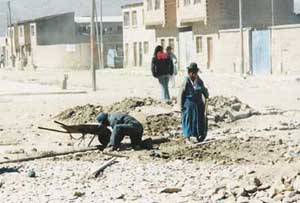
Strassenbau in Oruro/Bolivien
Photo: Eveline Rocha Torrez
|
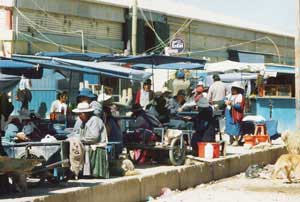
Bauernmarkt in Oruro/Bolivien
Photo: Eveline Rocha Torrez
|
|
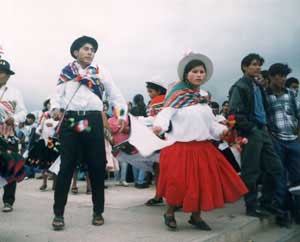
Anata Andina in Oruro/Bolivien
Photo: Rubén Rocha Torrez
|
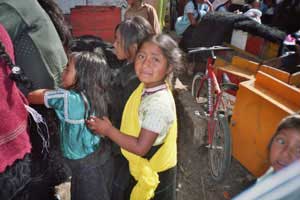
Kinder aus San Juan Chamula
in San Cristobal de las Casas/Chiapas/Mexiko
Photo: Eveline Rocha Torrez |
|
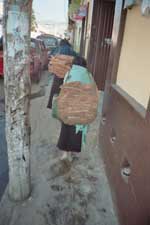
Frauen in San Cristobal de las Casas
Chiapas/Mexko
Photo: Eveline Rocha Torrez
|
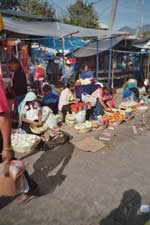
Frauen in San Cristobal de las Casas
Chiapas/Mexko
Photo: Eveline Rocha Torrez
|
|
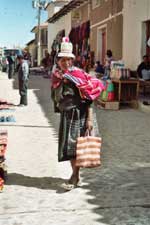
Frau am Markt von Tarabuco/Sucre/Bolivien
Photo: Eveline Rocha Torrez
|
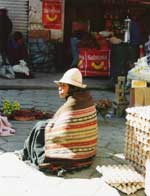
Verkäuferin am Markt von Oruro/Bolivien
Photo: Eveline Rocha Torrez
|
Media
In this section we are trying to collect mass media coverage on "Enlazando Alternativas 2" - if you miss an article you read about Enlazando Alternativas, we would kindly ask you to submit it (but please, bear in mind that this section is for mass media coverage, e.g. printed newspapers, magazines, TV-channels, etc.)
- "Die Presse" vom 30.11.2005: EU - Lateinamerika: Alternativgipfel in Wien - Von CORNELIA MAYRBÄURL
Globalisierungskritiker gegen Handelsabkommen.
Buenos Aires. Globalisierungskritiker planen während der EU-Präsidentschaft
einen Großauftritt in Wien: Parallel zum Mitte Mai stattfindenden EU-Lateinamerika-Gipfel
wird es einen vier Tage dauernden "Alternativgipfel" geben. Im Mittelpunkt
der beiden Treffen werden die Wirtschaftsbeziehungen zwischen den beiden Kontinenten
stehen. [PDF]



























